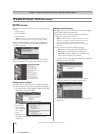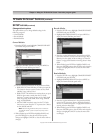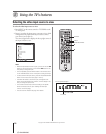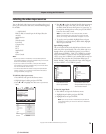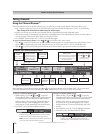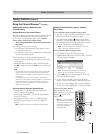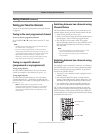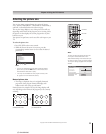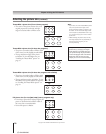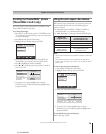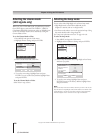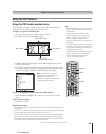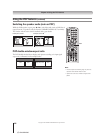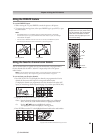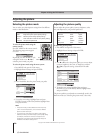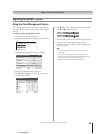
78
Copyright © 2005 TOSHIBA CORPORATION. All rights reserved.
(E) 52/62HMX95
A B C D E F G - - - - - - - - - - - - - - - -
A B C D E F G - - - - - - - - - - - - - - - - - - - - - - - - - -
A B C D E F G - - - - - - - - - - - - - - - -
TheaterWide 1 picture size (For 4:3 format program)
• The center of the picture remains close to its
original proportion, but the left and right
edges are stretched wider to fill the screen.
TheaterWide 2 picture size (for letter box programs)
• The picture is stretched wider to fill the width
of the screen, but only slightly stretched taller.
• The top and bottom edges of the picture
are hidden. To view the hidden areas, see
“Scrolling the TheaterWide
®
picture” on
page 79.
TheaterWide 3 picture size (for letter box programs with subtitles)
• The picture is stretched wider to fill the width
of the screen, but only slightly stretched taller.
• The top and bottom edges are hidden. To view
the hidden areas (such as subtitles or captions),
see “Scrolling the TheaterWide
®
picture” on
page 79.
Full picture size (for 16:9 [480i, 480p] source programs only)
• If receiving a squeezed 4:3 format program, the
picture is stretched wider to fill the width of
the screen, but not stretched taller.
• None of the picture is hidden.
Chapter 8: Using the TV’s features
Selecting the picture size (continued)
TheaterWide 2 picture size example
Full picture size example
TheaterWide 1 picture size example
TheaterWide 3 picture size example
Note:
• If you select one of the TheaterWide
®
picture
sizes, the top and bottom edges of the
picture (including subtitles or captions) may
be hidden. To view the hidden edges, either
scroll the picture (TheaterWide 2 and 3 only)
or try viewing the program in Full or Natural
picture size.
• When selecting the picture size, the way
the image displays will vary depending on
the format of the program you are
currently watching.
Using these functions to change the
picture size (i.e., changing the height/
width ratio) for any purpose other than
your private viewing may be prohibited
under the Copyright Laws of the United
States and other countries, and may
subject you to civil and criminal liability.



